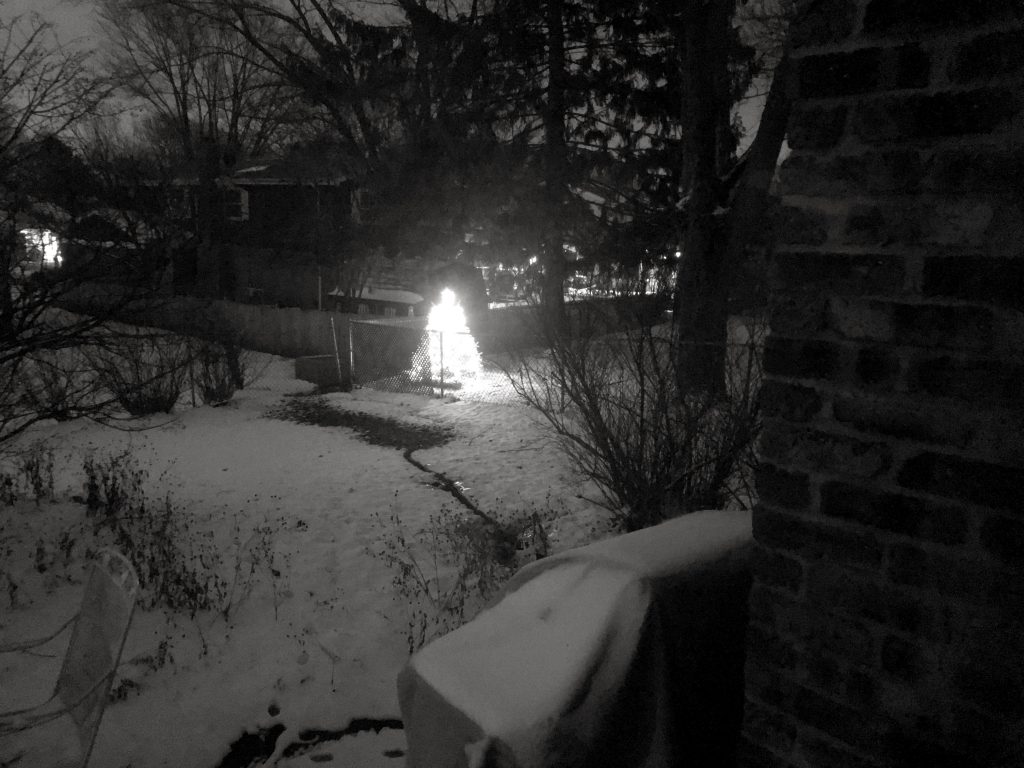
It has been a long time since I did anything with From78, but it has lingered in the back of my thoughts, whispering things to me. I plan to start doing more stuff here and sending it out without knowing if anyone will receive it.
Wish me luck.

It has been a long time since I did anything with From78, but it has lingered in the back of my thoughts, whispering things to me. I plan to start doing more stuff here and sending it out without knowing if anyone will receive it.
Wish me luck.
In this episode of From78 I talk with a fellow Podcrade from The Lost Horizon’s Network, Jason from The Regrettable Century. We talk about our own lives and our experiences as we have moved through time. The conversation gets into putting down roots v. drifting, fear of death, the pursuit of an impossible Justice to come, our ability or inability to choose our path in life, the impacts of technology on our lives as social beings, and more.
This was one of the best conversations I’ve had in a long time, and I hope you all enjoy it as well.
The outro track on today’s episode is a track called Go Small by the band Seaming. It is on the album The Birdwatcher’s Guide to Atrocity, which you can stream or pre-order now on Bandcamp.
Subscribe Info:
I woke up a little after 3AM, the hour of the wolf. I wanted to keep sleeping but my mind/body had other plans.
I’ve been spending time in bed reading things other people have written and posted on the internet.
As I do this I remember when I could not sleep in the times before there was an internet and I think, “I’m living in the future.”
It’s standard to bash the present as a surer and incoherent, because it is. But it’s also a realization of a fantasy of the past me —a board adolescent alone in the American Midwest.

It’s a few hours later and I can see the light of the day star starting to break up to night.
I’m reasonably sure I’ll have the feeling of jet-lag even though my body has not traveled.
Cayce, a character in the William Gibson novel Pattern Recognition called jet lag “soul delay”, because your body is in one play but your soul takes longer to get there. Will I have soul delay today, because my soul got stuck someplace around 3AM?
I spend a good amount of time thinking about identity politics. One of the things that I’ve come to believe is that there is a paradox at the very heart of identity politics today.

(Side note: I’m writing this as part of my attempt to document my head noise on a regular basis… This is not well thought out, but it is on my mind today. These thoughts might be very transitory, they may stick around relatively unchanged. Time will tell.)
To understand the paradox it is important to understand the tension that exists between one’s identity and the process of identification.
The way I see individual identity is something that differentiates an individual from all other individuals. This is why things like identity theaft are so problematic. When someone steals your identity they can steal something that is unique to the individual, that the individual uses to show he/she is singular within a society. In this way identity is something that separates us and isolates us. Ergo, identity makes us alone.
While I’m sure others will disagree with me, I see contemporary forms of Identification as something that people do to belong.
For example, when someone says,
“I identify as X”
By identifying with X (which is often an ideology, or a group) the person who identifies is, I think, saying I’m in and that others who don’t identify in the same way are out.
My conclusion is that identification is being used by many people as a way to have an identity but not pay the cost of being alone that having an identity demands.
Today I watched some birds fly around and land on some light posts and suspended wires. My thoughts in that liminal space where it is present but not focus on anything in particular, sort of a pleasant head noise playing in the back hallways of my mind.

Moments like this are important, they help me “decompress” and untangle the snarls that has accumulated.
As of late these moments are not frequent enough. I’m living in a near constant state of compression. There are always more emails and tasks piling up. No possibility for what the British psychoanalyst Winnicott called going-on-being, where the compression of being busy lets up and thinking can stretch out, relax, and unfold along unexpected lines.
The world did not stand still over the past few months, but it did slow down and get quiet. It’s been more still and contemplative than it has been for a long time.
People lives change speed and cadence all the time, but these changes are happening at an individual level, and our individual worlds are not usually synced up with one another. (One person slows down while another speeds up or stays still…)

Over the past few months it seems like people have been forced to slow down, for the longest duration of time, in a more synchronized way than they have at any other point during my life.
The longer this goes on the antsy people get. The more antsy people get the more the death drive wakes up.
I wonder if we are in for a synchronized activation of some major death drive mojo sometime in the not too distant future.
(I hope we are not!)
The summer before my sophomore in highs school, summer of 1994 specifically, I rented a movie called Pump Up the Volume on VHS form a local Blockbuster Video. I got home and watched it. Then I watched it again. It was one of those movies that speaks to awkward adolescent males thirsty to be rebellious and special but are too scared to take any real social risks.

(Just in case it is not obvious: I was such an adolescent male.)
The main character in the film is a kid named Mark Hunter (played by Christian Slater), who has moved to a new town where he does not know anyone and no one knows him. Hunter figures out how to set up a low-powered transmitter which he uses to run a pirate radio station. When Hunter broadcasts he creates a persona called Happy Harry Hard-on who says all the things Hunter wants to say but is to scared to say in public.
Mark Hunter, a high school student in a sleepy suburb of Phoenix, Arizona, starts an FM pirate radio station that broadcasts from the basement of his parents’ house. Mark is a loner, an outsider, whose only outlet for his teenage angst and aggression is his unauthorized radio station. His pirate station’s theme song is “Everybody Knows” by Leonard Cohen and there are glimpses of cassettes by such alternative musicians as The Jesus and Mary Chain, Camper Van Beethoven, Primal Scream, Soundgarden, Ice-T, Bad Brains, Concrete Blonde, Henry Rollins, and the Pixies. By day, Mark is seen as a loner, who has to make extreme effort to be sociable around others; by night, he expresses his outsider views about what is wrong with American society. When he speaks his mind about what is going on at his school and in the community, more and more of his fellow students tune in to hear his show. 1
Throughout my adolescents I had a fantasy of somehow getting enough money to buy the equipment necessary to start my own pirate radio station. Like most adolescents, I was never able to resist spending money on short term comforts (CDs, comics, fast-food, etc.) and so I never even came close to saving the money I’d need to turn my fantasy into a reality.
Today, as I write this, I’m wondering why it is that there are not ”pirate podcasts”. Is it because podcasts, which are available whenever we want them, fundamentally different from the ephemeral nature of radio? Maybe. I don’t really know.
Lacan has given us many an aphorism. One of the most famous of Lacanian aphorisms is,

il n’y a pas de rapport sexuel.1
This is usually translated as,
There is no such thing as a sexual relationship.
Thomas Svolos has written that a better translation for this equivocation would be “There is no such thing as a harmonious sexual relationship.” Svolos elaborates,
when it comes to the issue of sexuality as a relation to an other, to one’s intimate partner, we find Lacan’s most famous formulation on the matter, il n’y a pas de rapport sexuel, which we might translate as “there is no sexual relationship” or “there is no sexual harmony” or “there is no sexual ratio,” indicates that for every speaking being, sexuality is something that is struggled with in one way or another. Thus, there is no natural or harmonious relation between two speaking beings with regards to sexuality. There is no sexual utopia. Speaking beings will often act as if there is (why not?), but that is only a fantasy. 2
Simplifying this for myself I’d say that some relationships can be harmonious. Take for example when I order a coffee from a barista in a Starbucks.
I ask for an Americano. The barista tells me how much this will cost. I pay. They make me the Americano and give it to me. I leave.
That is a simple and harmonious relationship.
Other relationships have what we could broadly call a sexual component, a sexual tension, as part of them. Such relationships are always complex, which is to say they are not harmonious. They are not harmonious because the sexual tension will be unpredictable, it will lead to things being said or done that have unanticipated effects. Sometimes these effects will be enjoyable and sometimes they will be painful.
The main point: When sexuality is part of a relationship we don’t really know what is going to happen.
Lacan’s Seminar XVII: The Other Side of Psychoanalysis was given in 1969, in the wake of May 1968. During this seminar Lacan was heckled by some people who saw Lacan as a representative of “the master” they were attempting to overthrow through protest and revolution.
In response to the attempts to disrupt his teaching Lacan said,
“As hysterics, you demand a new master. You will get it!” 3
What I think this points out is the fact that just as not sexual (i.e. meaningful) relationship can be harmonious because meaningful relationships are sexual because they lack harmony. We all have a sexual relationship with society. Some will deny this, but its true.
Ergo no revolution, no matter how complete, no matter how effective, no matter how sweeping, can create harmony.
Today I thought the following to myself,
I need quiet, and lots of it.
I don’t mean I need there to be a lack of noise. What I need is a sort of quiet time, a slice of time that lacks the distracting pressure of tasks needing to be done. That task-pressure prevents the ability for me to think without really trying to think.

When I don’t get enough quiet my thoughts are like left over burned coffee that’s been sitting on heat the for several hours too long. No one wants to drink that shit, least of all me.
The quiet I desire is the kind that cleans the acidic sticky muck off my psyche.
Will I get the quiet I want? This week is extra-plus-busy, so probably not.
But maybe…
I just started listening to the audio-book version of William Gibson’s book The Peripheral.1

Early on in the book, there is a description of one character named Shayleen who is interested in a former marine who is kinda messed up after going through some crazy special-forces type of stuff.
On page 8 of the book there is the following few sentences:
Shaylene had gone out with him a few times in high school, but she’d gotten more interested when he’d come back from the marines, with that chest and the stories around town about Haptic Recon 1. Flynne figured Shaylene was basically doing what the relationship shows called romanticism pathology.
This stuck out to me because, at some point, to some degree or another, we have all romanticized pathology. Right?